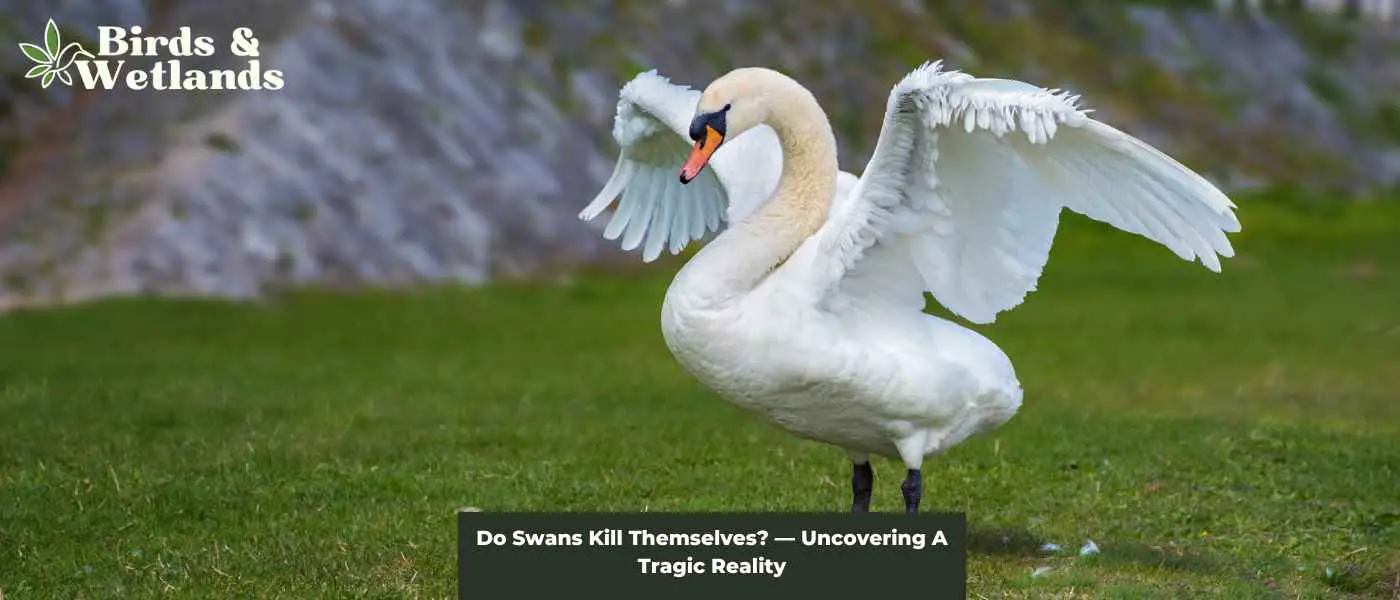Swans are seen as symbols of beauty, grace and love. These majestic birds form monogamous pairs and are extremely protective of their eggs and young. But do swans kill themselves?
It’s quite possible that swans commit suicide or, more accurately, behave in ways that can be considered suicidal. Suicide is a complex and multifactorial phenomenon that is not limited to humans. There are several reports of mourning swans refusing to eat, swimming in deep water until they drown, completely withdrawing from their own flock, and spending time alone.
The question of why swans would kill themselves is complicated and has yet to be fully understood. Certain behavioral and psychological factors may play a role, such as depression, stress, a broken heart or a loss of a mate.
Further research into these particular self-destructive traits of swans is needed to fully understand why they would attempt to hurt themselves, intentionally or unintentionally.
Key Takeaways on Swans Killing Themselves
- Swans form monogamous pairs that are highly protective of their eggs and young.
- Swans acting in ways considered suicidal such as refusing to eat or withdrawing from their flocks, have been reported.
- Swans have been known to remain loyal to one mate even if death occurs; however, it is unlikely they actively attempt suicide due to grief.
Do swans kill themselves if their mate dies?
Swans, long beloved symbols of love and fidelity, are renowned for their faithful bond with a mate in life, which can last several years or even a lifetime. This has raised the question of whether or not swans will take drastic action, such as killing themselves, if their partner dies.
Swans have been observed committing suicide before. While heartbreaking stories have occasionally emerged about swans that remain by the side of their dead mates or refuse to find new partners even after the death of their partner has occurred, it has been difficult to prove that they actively attempt suicide. However, it is believed that this is part of the swan’s grieving process.
Ultimately, although it can be argued that swans demonstrate profound loyalty and love towards their partners, which could manifest itself in extreme behavior if tragedy strikes, it is unlikely that they actually commit suicide as a consequence.
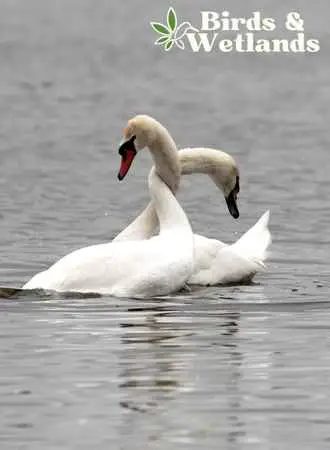
Does a swan only love once?
The idea of swans only loving once has been romanticized through centuries of stories, inspiring countless movies and lyrics from popular songs. But does this notion hold any truth?
The reality may be more complex if we look beyond the tales and myths. It is not a matter of whether or not a swan can love multiple partners but rather how the nature of their relationship evolves over time.
Swans are well known for forming lasting bonds. In most cases, swans have only one partner for their entire life. They form strong and determined connections that last through their lifespan together. A swan’s devotion is witness to the beautiful yet fragile bond they weave over years of loyalty and trust.
In their commitment to one another, swans demonstrate remarkable fidelity that even death may not be enough to tear them apart. Once two swans commit to each other, they remain monogamous and devoted companions for life.
But no matter what happens during their lives, these majestic birds doubtlessly form strong connections worth considering when examining everlasting love.
Do swans mate again if one dies?
Swans are members of the Anatidae family which also includes geese and ducks. They are known for being monogamous animals, which means they form long-term pair bonds with one mate. However, if one swan in a pair dies, the surviving swan will often seek out a new partner.
When swans form a pair bond, they go through a courtship ritual that includes calling each other which is also called a “swan song”, bowing, flapping of the wings and even presenting gifts of twigs and reeds to one another.
Once a pair bond is established, the swans will mate for life. However, if one swan in the pair dies, the surviving mate will often go through the courtship ritual again to find a different or other partner.
It’s worth noting that not all swans will mate again after losing a mate. Some swans will choose to remain alone for the rest of their lives. But for many swans, the drive to find a new mate is strong, as they are naturally social animals that thrive in the company of other swans.
It’s also worth mentioning that swans can live for a long time, up to 20 years, in the wild, and they can form multiple pair bonds in their lifetime.
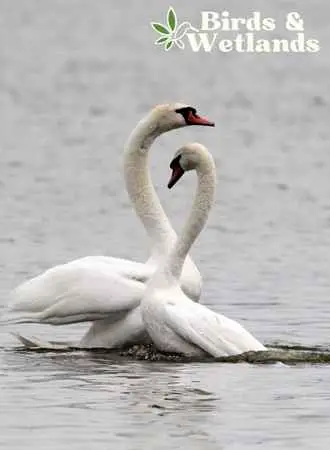
Do swans kill each other?
While most swans often represent love and romance but can also be highly aggressive creatures. It is common for adult swans to attack each other to secure territory or maintain dominance in the wilds. They will also sometimes turn on their own offspring as they reach maturity and attempt to find their own place in the world.
This aggression isn’t limited to other birds either; river users and other waterfowl can fall victim to such attacks by adult swans guarding their homes.
Related Questions on Swans
Can a black swan mate with a white swan?
Hybridization is the phenomenon of crossbreeding between two different species. This can occur naturally in the wild, or humans can artificially induce it.
Hybridization can create new genetic combinations and have a variety of effects on the resulting offspring and the populations of the parent species.
Although swans typically do not hybridize, a black swan and a mute swan can hybridize since they share the same breeding habitat. This hybridization is rare, but it has been observed in the wild. However, in most cases, the hybrids are sterile and cannot reproduce.
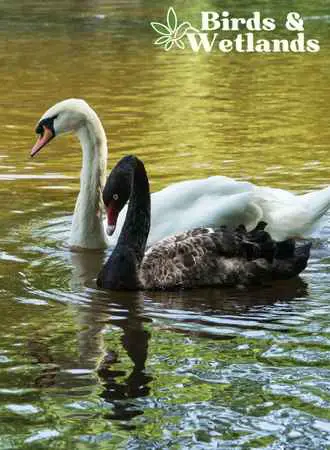
Can mute swans breed with whooper swans?
Mute swans don’t breed with whoopers or vice versa. While both species are closely related and share many similarities, this idea of interspecies mating has yet to be widely accepted.
Mute swans are slightly smaller than whooper swans while also boasting a lavish black and orange bill compared to the black beak with yellow lores that characterize whoopers.
Is the male swan more aggressive than the female swan?
In many species, including swans, males are typically more aggressive during breeding season as they defend their territory and mates. However, both male and female swans can be aggressive when protecting their nests or young. Generally, the level of aggression can vary depending on the individual swan and its specific circumstances.
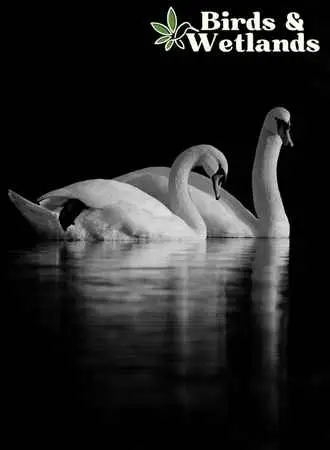
Do nesting female swans feast before they start incubating?
Nesting females, like most birds, may eat less while incubating their eggs. The egg laying process begins with an egg being laid every 12-24 hours.
During the incubation period, the female will take short breaks to eat, drink, and stretch her legs but will spend most of her time sitting on her nest to keep the eggs warm. It is completely normal for the female swan to lose weight during the incubation and nesting period.
Once all the eggs hatch, both parents will spend more time foraging for food to feed the cygnets. The time spent foraging for food will increase as the cygnets grow and require more food to sustain themselves.
Can black swans mate with trumpeter swans?
There are no current documentations of black swans breeding with trumpeter swans. This is not surprising given that the preferred habitats of these swans don’t often overlap.
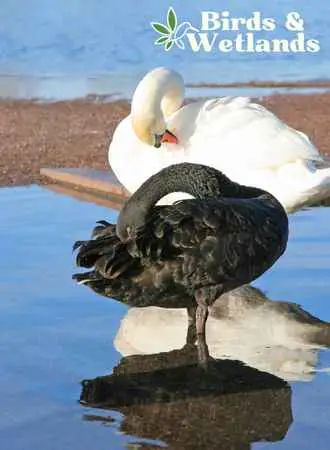
Are black-necked swans monogamous?
The black-necked swan (Cygnus melancoryphus) of South America is a monogamous species, which means that they form a pair bond with a single partner and remain together for multiple breeding seasons.
Once a pair bond has been established during the mating season, the male and female will defend their territory and mating pair from other potential partners. They will also work together to build a swan’s nest and raise their new born cygnets.
What predators eat swans?
Predators of both cygnets and full-grown swans typically vary depending on the species of swan. Common predators include coyotes, foxes, raccoons, snapping turtles, large birds like hawks and eagles, and large perch. They can also fall victim to large fish that lurk beneath the surface of ponds such as steelhead trout and northern pike.
What is the average lifespan of swans?
With all the hazards swans face in the wild including overhead cables, natural events, lead poisoning, fishing tackle injuries, these birds live between between 12 to 15 years. Swans in a protected environment live longer than those that live in the wild.
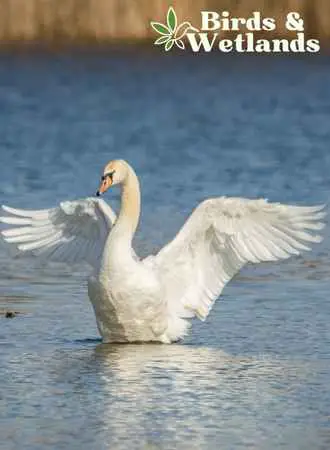
Do swans build another nest if the previous one was destroyed?
If a young couple lose their nest to natural events such as high tides, they will re-nest. Such incidents are part of their growth process, the bird couple will know not to build nest on that site in the future.

